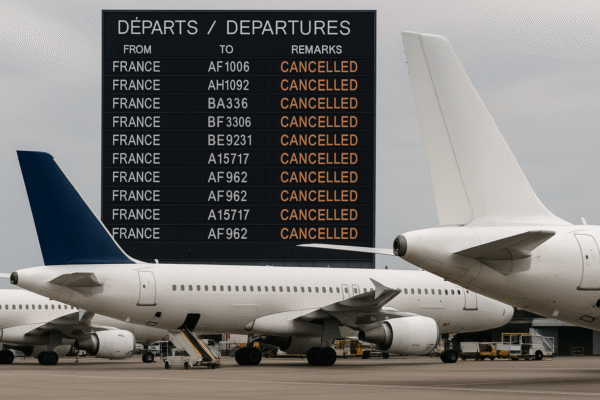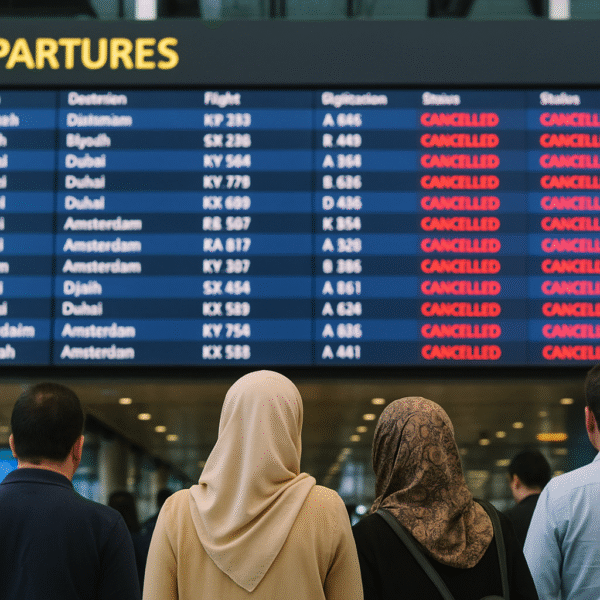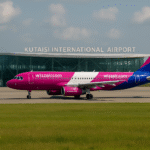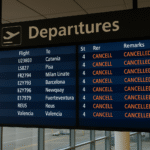Travelers across the Middle East are grappling with widespread disruptions as Saudia, Flynas, and Royal Jordanian collectively announce 14 flight cancellations today. This major shakeup has thrown operations at key regional hubs—including Riyadh, Dammam, Dubai, and Amman—into disarray, forcing passengers to scramble for alternatives.
Disruptions Affect Vital Air Routes
Saudia’s cancellations predominantly involve flights between Riyadh and Dammam (seven flights) and one key link to Jeddah. These routes serve as critical domestic arteries, connecting Saudi Arabia’s capital with the Eastern Province and the Red Sea gateway. The sudden suspension of these flights is causing cascading delays for linking journeys both domestically and internationally.
Flynas meanwhile has axed three flights on its Riyadh–Dubai corridor as well as one between Dubai and Jeddah. Given Riyadh–Dubai is a high-traffic business route, these disruptions are severely impacting both business executives and transit passengers, especially those connecting to broader international flights.
Royal Jordanian’s cancellations include flights between Amman and Maastricht, Netherlands—disrupting a vital Europe–Middle East connection relied upon by both corporate and leisure travelers.
Causes and Passenger Impact
Although official statements from the airlines are pending, early reporting attributes the cancellations to a mix of operational snags and logistical challenges, causing ripples across the region’s busiest airports. Roughly today’s 14 cancellations underline how fragile aviation operations can be amid infrastructure or staffing shortfalls.
Thousands of travelers are now scrambling—some left stranded at terminals, others urgently contacting airlines for rerouting or refunds. With limited capacity on alternate flights, customer service channels are overwhelmed, creating a stressful travel environment during peak hours.
Essential Advice for Affected Travelers
- Contact your airline immediately: All carriers recommend reaching out to customer service to explore rebooking, full refunds, or rescheduling options.
- Visit airport desks: On-site counters at Riyadh’s King Khalid International, Dubai International, Dammam’s King Fahd International, and Amman’s Queen Alia International are being rushed by anxious passengers.
- Stay flexible: If flights are fully booked, consider alternate routes or operators. Some travelers may prefer to wait for next-day flights or book via different airlines to reach their destination.
Regional Aviation Environment
This wave of cancellations arrives amidst a season of volatility in Middle Eastern aviation. Earlier this year, airspace closures triggered by geopolitical tensions led to broader flight suspensions and reroutes across the region. Though most of the air corridors have reopened, today’s operational issues show that travel disruptions remain a potent risk even as geopolitical pressures have eased.
Economic and Tourism Implications
These cancellations strike at a sensitive time. The region’s economies—particularly in Saudi Arabia, the UAE, and Jordan—are heavily invested in tourism and business travel. Disruptions of this magnitude not only inconvenience individual travelers but also echo through hotel bookings, meetings, conferences, and connecting travel plans.
What Airlines Typically Offer in Such Situations
- Saudia and Flynas: Usually offer rerouting or refunds, though Puerto-cancellation policies may vary by fare type.
- Flynas: Standard practice includes holding unused fare in a credit shell minus a cancellation fee—information available via their “Manage My Booking” services.
- Royal Jordanian: In past regional disruption scenarios, the airline allowed free rebooking, vouchers, or refunds for impacted passengers—even waiving penalties when flights were canceled by the airline.
Passengers should check their eligibility depending on ticket type and obtain written confirmation of any alternative arrangements.
Looking Ahead
As Saudia, Flynas, and Royal Jordanian work to resolve the operational backlog, industry eyes are on how quickly they can restore normal operations. In the short term:
- Airline operations teams will likely issue more cancellations or flight delays as they rebalance crew and aircraft deployments.
- Passengers should monitor official airline channels—including mobile apps, airport alerts, and email—for continuous updates.
- Travelers aiming to continue their journeys are advised to confirm flight status before heading to airports to reduce wasted travel and stress.
Summary Table of Disruptions
| Airline | Affected Routes | Impact |
|---|---|---|
| Saudia | Riyadh ↔ Dammam (multiple flights), Riyadh → Jeddah | Domestic stronghold; thousands of travelers affected |
| Flynas | Riyadh ↔ Dubai, Dubai → Jeddah | Crucial business corridor; transit passengers disrupted |
| Royal Jordanian | Amman ↔ Maastricht | Key Europe–Middle East link; both leisure and business travel disrupted |
Final Note: The unfolding cancellations reinforce the importance of flexibility in travel planning. With airlines navigating operational pressures, passengers must stay informed, remain adaptable, and utilize official channels to manage their journeys effectively.
For more travel news like this, keep reading Global Travel Wire



















